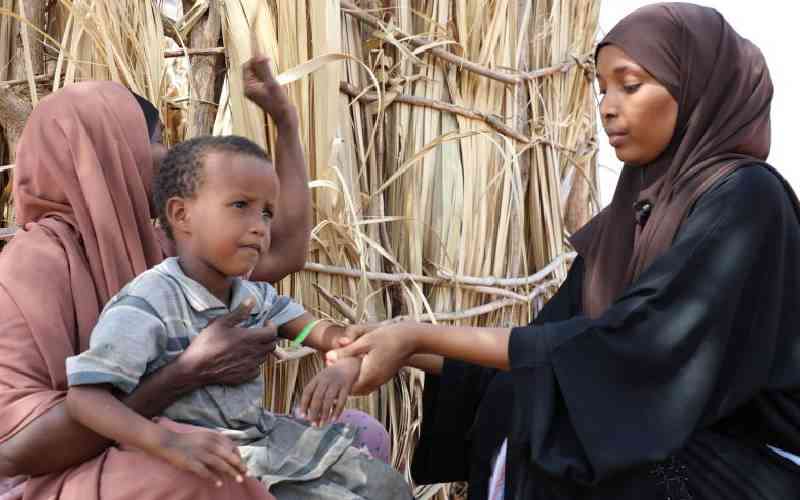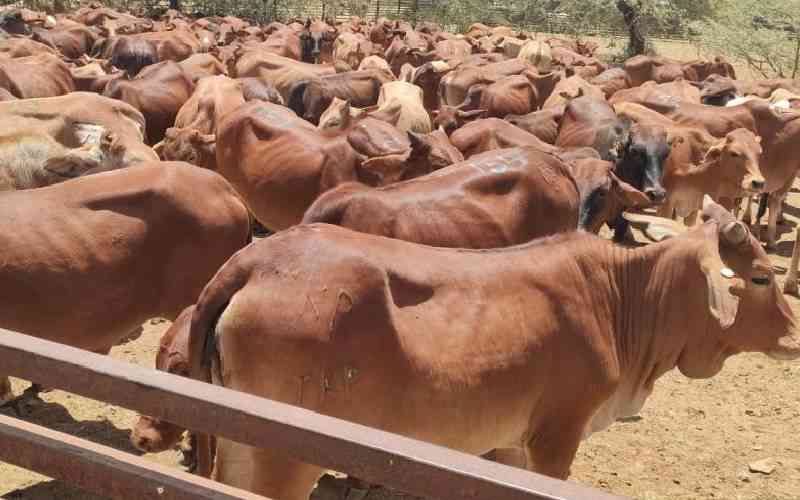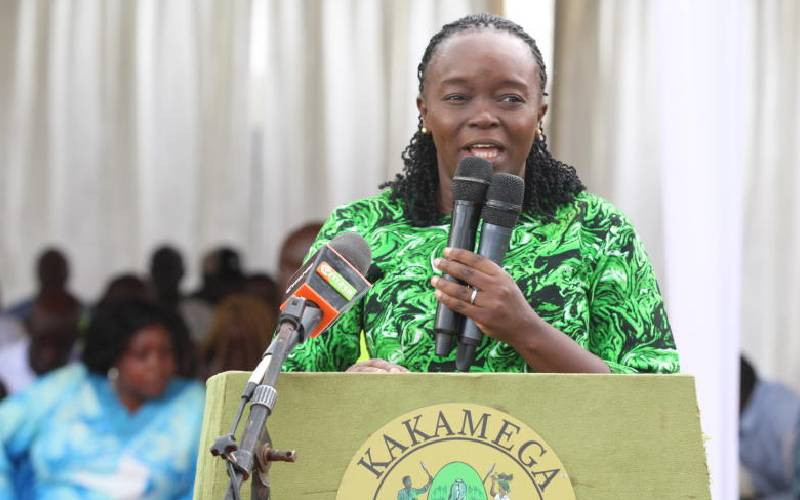
Scores have died and property destroyed.
Rescue missions continue to recover bodies buried in mud, after Cyclone Freddy, an exceptionally long-lasting storm hit Southern African region.
Hopes, of finding survivors, dwindle every hour.
Malawi was the worst hit, with more than 326 deaths reported. Mozambique and Madagascar were also affected by the cyclone which formed in February off the coast of Australia.
The phenomenon, the longest ever recorded, crossed an estimate of 8,000 kilometres in the Indian Ocean.
Heavy rains witnessed have caused flooding and landslides in Malawi, resulting in a health crisis.
The landlocked country is now fighting an outbreak of cholera.
- Clinical officers begin strike as crisis in health sector worsens
- Clinical officers are first point of call for patients
- Ruto remains mute as healthcare crisis worsens
- 17 bodies threaten to join doctor's strike
Keep Reading
Experts have attributed the cyclone to the warming of the oceans, fearing that Africa may face more effects of climate change, which may trigger more diseases, and cripple an already strained healthcare systems.
"Cyclone is among the worst crisis facing Africa. Floods are also causing havoc," said Dr Adelheid Onyango, WHO Director of the Universal Health Coverage, in Africa.
In a media engagement in Kigali, Onyango said floods and other climate-related crisis are likely to strain the healthcare system in the continent.
Malawi has recorded over 42,000 cumulated cases of cholera and 1,300 deaths.
Mohamed Malick Fall, Regional Director for Eastern and Southern Africa, Unicef, said the agency in partnership with Gavi, Vaccine Alliance is distributing vaccines, in addition to other commodities, to help fight the disease.
At least 2.9 million doses have been dispatched to the country, from the Gavi-supported Global Oral Cholera Vaccine Stockpile.
"Cholera is one of the health crisis we are fighting," Fall told The Saturday Standard in an interview.
Kenya has also recorded 100 cholera deaths, that saw the Ministry of Health administer 2.2 million cholera doses.
Experts note that climate change will put pressure on the already stressed healthcare system.
In many African countries, the healthcare infrastructure is not well developed and there is scarce resources, thus any additional pressure is bad for health.
Dr Ahmed Ogwell, the Acting Director, Africa Centre for Disease Control and Prevention (Africa CDC), says there's need to find lasting solutions to diseases that are likely to cause pandemics.
"We need to revamp our healthcare system, to avoid anticipated outbreaks as they cripple our healthcare system," he adds.
Africa's health system was stressed during the Covid-19 pandemic that left patients fighting for the limited resources like oxygen and Intensive Care Unit (ICU) beds.
A study by Lancet Countdown on health and climate change published this month, titled 'Progress on health and climate change in Africa', notes that Africa is among the most vulnerable continents facing the dire consequences of climate change.
As per the report, in 2022, extreme weather events in Africa killed more than 4,000 people and affected a further 19 million.
Drought and famine also killed thousands and affected millions of people in Uganda and Ethiopia.
In Tunisia, high temperatures and extreme wildfires were recorded, whereas Nigeria experienced the worst floods in decades, with about two million people affected by floods in Chad.
"Impacts of climate change on health, expose the health needs and opportunities for adaptation and mitigation," reads a section of the study.
Temperatures in the continent are also on the rise.
High temperatures according to scientists lead to an increase in the frequency, intensity, and duration of heatwaves across the continent, resulting in an increase in heat-related morbidity and mortality.
In the study, scientists documented that in The Gambia, pregnant women farmers experience significant heat stress and foetal strain while working outdoors on fields.
"Numerous other health outcomes are associated with exposure to extreme heat: heatstroke, acute kidney injury, adverse pregnancy outcomes, and poor mental health," adds the report.
As the adverse effects of climate change are felt on the healthcare system, WHO has warned of a surge in mosquito-borne diseases due to global warming.
The global organisation listed dengue and malaria as common diseases linked to erratic weather patterns.
Cases of zika virus and chikungunya area also expected to rise.
According to the WHO report, Pacific Island is already reporting a surge in malaria, chikungunya and dengue fever.
The species is reported to spread fast in different climatic conditions, risking more cases.
Data reveals that between 2012 and 2021, there has been at least 69 outbreaks of dengue fever, 15 outbreaks of chikungunya, and 12 of Zika virus.
Chikungunya, dengue fever and zika virus are all transmitted through mosquito bites, which thrive in warm and humid environments.
Kenya is also among countries witnessing climate related diseases, namely zika virus and chikungunya, with a surge in malaria cases.
Last month, the Kenya Medical and Research Institution (Kemri) announced the invasion of mosquito vector-Anopheles Stephensi.
Kenya becomes the sixth country in the continent to report invasion of the species. Countries where invasion of the mosquito has been reported include Djibouti, Ethiopia, Sudan, Somalia, and Nigeria.
Prof Oyewale Tomori, a virologist from Nigeria, said the continent needs to understand causes of climate change, and take precautions, to avoid health crisis.
"We need to know why for example flooding and wildfires are occurring, and find solutions, to avoid a stretch on our health system.
During floods, we record outbreaks of diseases like cholera and malaria, diseases which can be prevented with early interventions," said the virologist.
Tomori said most diseases currently reported in the continent are triggered by destruction of the environment and invading animal habitat.
When temperatures are too high, he explained, vectors increase, and so do diseases.
"Increasing contacts between animals and vectors is making human to suffer disease which were limited to animals," said the virologist.
He gave an example of yellow fever, a disease transmitted between monkeys by forest-dwelling mosquitoes.
On his part, Shadrack Gikonyo a health economist, at Strategic Purchasing Africa Resource Centre said climate change is currently a major challenge in healthcare, particularly because it affects determinants of health.
Among determinants affected include clean air, safe drinking water, food, secure shelter.
"It is estimated that between $2 to $4 billion are estimated to be used on direct health cost associated with climate change, globally, every year," said Gikonyo, also a health economist.
With the developed countries allocating over $4,000 dollars per person annually on healthcare, Africa allocates below $50 dollars, per person, Gikonyo stressed on the need by African states to mitigate climate change.
For example, he observed that states can adapt better farming technologies to fight malnutrition in children, adding that malnutrition predisposes children to many diseases like malaria and anaemia.
Further, Gikonyo said Kenya and Africa risks losing gains made in the fight against the three top killer diseases - malaria, HIV and TB.
For instance, due to the prolonged drought, HIV patients are not able to get nutritional support.
"HIV patients who do not get a balanced diet is likely to develop weak immune system, and is susceptible to infections, and deaths," said Gikonyo.
Additionally, Dr Zakari Ali, a nutritionist, at Medical Research Council in The Gambia said climate change is reducing food productivity.
"The rate of malnutrition in children is worrying because our agricultural production is low, and what we harvest is not of nutritional value," said Ali.
 The Standard Group Plc is a multi-media organization with investments in media platforms spanning newspaper print
operations, television, radio broadcasting, digital and online services. The Standard Group is recognized as a
leading multi-media house in Kenya with a key influence in matters of national and international interest.
The Standard Group Plc is a multi-media organization with investments in media platforms spanning newspaper print
operations, television, radio broadcasting, digital and online services. The Standard Group is recognized as a
leading multi-media house in Kenya with a key influence in matters of national and international interest.











